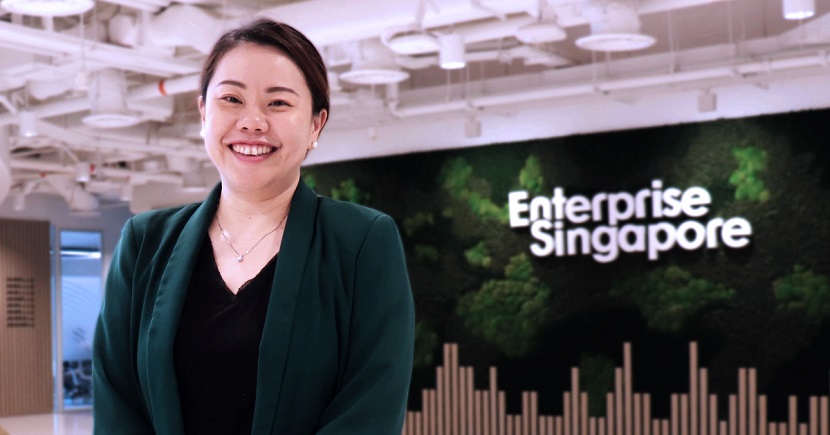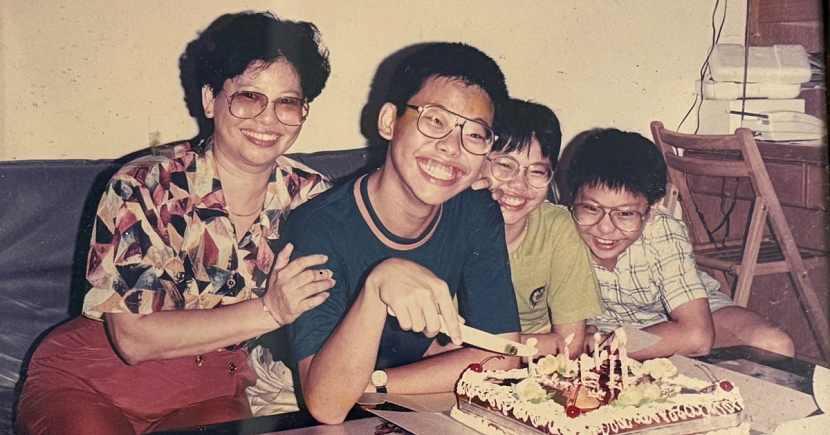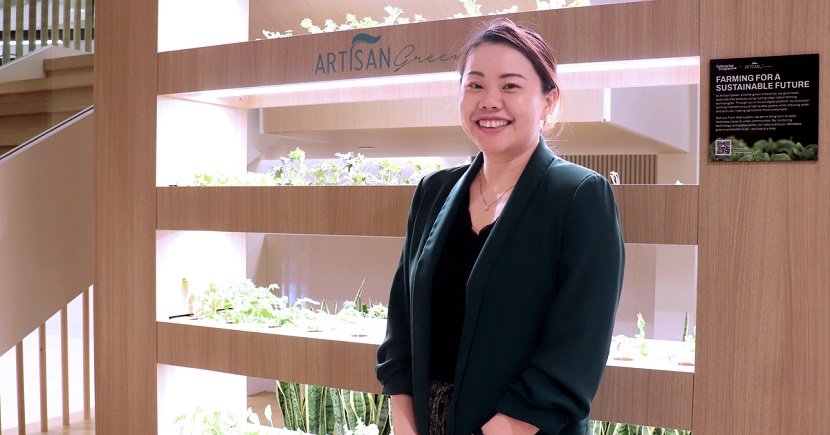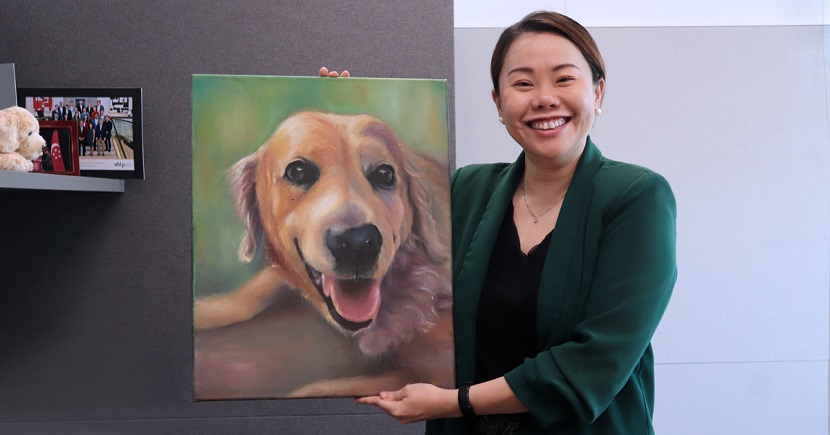Growing Conversations: 'Secret rebel' leader championing enterprise growth
Growing Conversations – this is a series where we peel back the layers, sharing how Enterprise Singapore is innovating, disrupting and transforming from within to champion growth for our local businesses across industries. Read on to discover how we journey alongside them, wherever they are growing.

Imagine waking up before dawn to make trips across the Causeway just to attend primary school in Singapore every day.
That’s what Cindy Khoo, Managing Director of Enterprise Singapore once had to do.
In this instalment, the middle child and self-proclaimed ‘secret rebel’ shares how she brings the same tenacity in supporting the transformation of our key industries and formulating strategies to uplift our Singapore companies.

Hi Cindy, before we dive into work, we want to know more about you as a person. Can you describe yourself in three words?
I like to tell people that I’m a “career civil servant”.
It’s funny because that’s not something that you grow up thinking that you will become. No kindergarten kid will write down “civil servant” when asked about their dream job.
Speaking of childhood, most people don’t know that I was born in Malaysia. I was commuting daily across the causeway to attend primary school in Woodlands, since Primary 1. My family eventually moved to Singapore when I was in Primary 4, and I became a Singapore Citizen when I was 12.
I am the middle child among two brothers. Growing up, I was neither the responsible older child nor the coddled younger one. I often had to play both sides to keep the peace. From there, I learned that if I can maintain harmony without drawing attention to myself, I can get away with a lot of things. That’s why I always considered myself to be a ‘secret rebel’ – finding creative ways to solve problems without rocking the boat.
This is probably where I got my instincts for leadership in the public sector. As a civil servant, you should have a point of view and sense of what needs to be done and how things can be improved for the betterment of Singapore and Singaporeans. Don’t just follow the rules blindly; anyone can do that. If you really want to drive change, you must think deeply about the why, and get everyone’s buy-in to achieve the what.
You were a Public Service Commission (PSC) scholar as well. What was your journey like, transitioning from being a student to being in the Public Service?
I did my Bachelor’s in the US, graduating with a Bachelor of Science in Electrical and Computer Engineering, and a Bachelor of Arts in Political Science from the University of Illinois.
Back then, Engineering felt like a natural choice for me. I was a triple science student and excelled in my sciences and maths. I thought that I could get by when I got to university, but I was so wrong. I struggled to keep up academically for the first time in my life. I learnt then that to truly excel in something, you need to have intrinsic motivation. You must really love what you’re doing, which was something that I saw in a lot of my classmates. Being studious and smart alone won’t cut it.
That was a very low period for me. It felt as though I was drifting in and out of days and just going through the motions. I turned to journalling, which helped tremendously. After many deep reflections, I realised that it’s okay to not excel in everything. What’s more important is that I find my own niche and strengths.
That was my motivation in taking a second degree in Political Science, which I really enjoyed. The classes tended to focus on understanding the American political system and took an America-centric lens when analysing international politics. The lessons as well as discussions with classmates gave me insight into a governance environment that was very different from Singapore. I found the subject intellectually stimulating, which made the experience all worthwhile.
Just like my daily commutes from Malaysia to Singapore to go to school, the resilience that I built during my university days guided me through my first stint in the Public Service.
Back in 2005, I was posted to Trade Division in the Ministry of Trade and Industry (MTI). While I found the job scope very interesting, I was struggling. Many of my daily tasks required me to be methodical and detail-oriented, something I was not natural at. I was doubling down and giving it my all, and my bosses were very encouraging, but I was still not performing as well as I should. Deep down in my heart I knew that I was not thriving.
What got me through was reflecting on my time in university. I learnt to not tie my self-esteem so tightly to extrinsic rewards and recognition. All I can focus on is to put in my utmost effort in whatever I do. That mentality allowed me to be more sanguine about the whole experience.

Thanks for being so candid and open about the difficulties you faced when starting out. What was the turning point in your career?
Things started turning for the better during my second stint at the Ministry of Health (MOH).
As I mentioned before, I’m a bit of a ‘secret rebel’. This characteristic served me well in my MOH job, where I looked after Industry Development as well as Systems Governance and Planning. Because these portfolios were newly created and the job scopes still nascent, that meant that I often had the freedom to shape and execute ideas in different ways. It helped that I had a senior leader who saw something in me. She decided to take me under her wing, giving me a lot of guidance and opportunities to try new things. I managed to surprise my bosses (and even myself) with what I was capable of, and that was when my career started to pick up.
At that time, a key issue I had to tackle was figuring out ways to tighten governance while building stronger relationships with our public hospitals. During that stint, I worked closely with the then-PS of MOH, engaging with various senior leaders within the public healthcare system. That required a lot of people skills, as I had to read the situation and grasp their motivations to determine how to respond in each scenario.
There was no straightforward way to resolve the issues at hand. I had to be creative and resourceful, and that was what made it so interesting.
That was my first venture into organisational development, which involved elements ranging from leadership development to system governance, organisational design and more. I discovered my strengths, realising that I was good with people, and sensitive to interpersonal dynamics. Perhaps my childhood experiences with my brothers helped prepare me for this!
Once your career took a turn for the better, was there a particular achievement that stood out to you?
After MOH, I joined the Public Service Division (PSD), looking after leadership development. There, I had a once-in-a-lifetime opportunity to review and transform our leadership development ecosystem. It eventually led to the setting up of the Public Sector Leadership Programme (PSLP), which aims to develop sectoral leaders who are equipped with deep knowledge of key sectors of the Government, such as economy building, social and security domains.
This is an alternative track to the Administrative Service, which focuses more on grooming generalist leaders that can provide cross-sectoral perspectives. Having different leadership pipelines ensures that our collective leadership consists of individuals with diverse experiences, skillsets and perspectives.
On a personal level, I’ve always believed that the strength of any system lies in its inherent diversity, and I resisted the notion that only Administrative Officers made good leaders. There should be multiple routes to success, to cater to the range of talents amongst us and to meet the different organisational needs across the government. This is why the establishment of the PSLP is my most memorable achievement to date.
On hindsight, the stars really aligned for me in this case. If I had joined at a different time, I might not have had the privilege to work on this review. Cliché, but it really is a matter of being at the right place at the right time.
After PSD, I took a year off work to do a Masters in Public Administration at the Harvard Kennedy School. When I returned, I had a stint at the Ministry of Education followed by the Prime Minister’s Office. Afterwards, I joined Enterprise Singapore, where I am right now!
Can you share more about your role as Managing Director of Enterprise Singapore?
If you look at our name, the word “enterprise” stands out. At Enterprise Singapore, we don’t just focus on growing enterprises. We also encourage the mindset of being enterprising; being resourceful. It’s about having creativity, motivation and the drive to accomplish difficult things or things that have not yet been done.
Being enterprising is at the core of the Singapore spirit. Just look at us – we are a small island with no natural resources and no natural competitive advantage compared to many other countries. Our Singapore enterprises are underdogs in the global business landscape. And yet, here we are today, punching above our weight.
We thrive against all odds, and that grit really resonates with me. This mindset guides my role as MD. As part of the senior leadership team, I provide clarity on what direction our organisation should take to keep growing. As a leader, I aim to nurture a safe space to push boundaries.
I work with the rest of the leadership team to streamline processes and promote innovation. For example, we have an annual idea incubator known as ‘Innofest’, where officers come together to think outside of the box, solutioning ideas to problems statements related to internal organisational strategies or even Singapore’s economy and business ecosystem.
My goal is to cultivate an organisation of ‘secret rebels’— a community of people who focus on changing our world for the better, perhaps quietly and subtly, but undoubtedly meaningfully.

We found out that you’re quite the painter yourself. How did you get into it?
It all started years ago, when I went to a dog charity art auction and fell in love with this beautiful charcoal drawing of a dog. I had a dog at the time, a golden retriever called Tae, and I decided to sign up for art classes so that I can create drawings of her.
I started with charcoal drawing and over time, found myself dabbling with oil painting, getting more comfortable with adding colour into my art. Painting was an accidental hobby. I didn’t think that I would end up going for as long and as far into it as I did! It became a haven for me, and a safe space where I can clear my mind and express myself.
Thanks for sharing your journey with us! Growth has been a consistent theme so far, from your time as a student to who you are today. Any advice on how an individual and organisation can maintain a growth mindset?
Growth is self-directed, but it cannot be self-oriented.
The only way to maintain a growth mindset is to take yourself out of the equation. Dig deep and find your purpose. It doesn’t matter whether you’re good at something or not. What matters is why, what and who you’re doing it for. Once you have a purpose beyond yourself, you develop a stronger sense of resilience when things don’t go well or when you face criticisms, and you’ll also start to treat yourself with more kindness and grace.
And always remember that at the end of the day, it’s okay to not succeed in something. It’s normal to fail, so don’t beat yourself up over it. Instead, focus on how much closer you are to your goals now than you were before.

